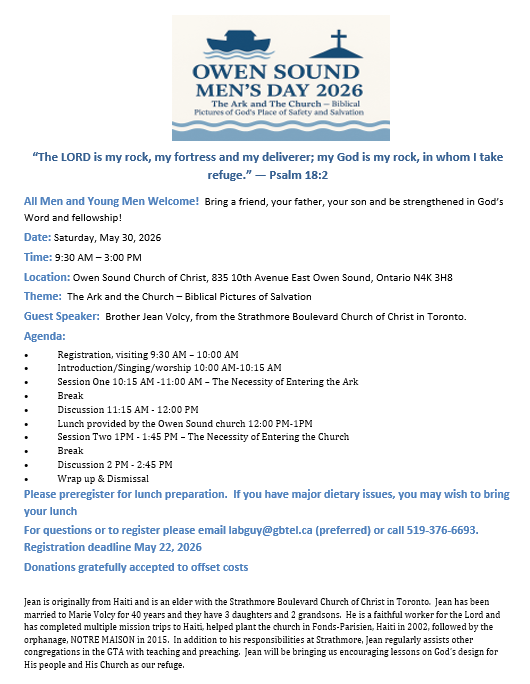Psalm 41
When the New Testament says that something in Jesus’ life “fulfilled” a statement in the Old Testament, we tend to assume that the Old Testament statement was a prediction of Jesus. In some cases, this is correct, but in several cases it is not correct.
In many cases Jesus fulfilled a statement that was not a specific prediction of him but a general statement of what has been and will be the common lot of God’s people. Jesus went through what we commonly go through. This is critical to his role as our high priest (see Heb 4:14-5:10).







We do the Bible no favour when we refuse to accept the text as it stands and insist on making miraculous things out of those that were not miraculous, according to what the Bible says. We should accept the miracles that the Bible claims. There is no need to add to those claims, making things miraculous that the Bible never said were miraculous or making a prediction of something that the Bible never called a prediction.
We will normally learn more if we read the Old Testament first in its own right, and then turn to the use that the New Testament makes of it. If we do so, we will gain a deeper insight into God’s will for us, and especially a deeper insight into what Jesus has done for us.
This Psalm contains three simple truths, all of which we tend to forget or even deny.
The Lord helps …
The first of these is that Lord helps those who help others.
Blessed is the one who considers the poor! In the day of trouble the Lord delivers him; 2 the Lord protects him and keeps him alive; he is called blessed in the land; you do not give him up to the will of his enemies. 3 The Lord sustains him on his sickbed; in his illness you restore him to full health. (1-3)
The popular proverbial claim, “God helps those who help themselves” is seriously in error. He helps those who help others. This is a truth also taught in Proverbs 19:17, 28:27, Luke 12:33, James 1:27; 2:13 and in other places.
The Lord is gracious …
The second truth is that the Lord is gracious to those who admit their sin. “As for me, I said, ‘O LORD, be gracious to me; heal me, for I have sinned against you!’” (4)
This also is a truth found all through the Bible. Passages like Psalm 32:3-5, Acts 8:22, and James 5:16 will spring to many minds as confirming this truth. Note that the “integrity” mentioned in verse 12 is not perfection but rather admission of imperfection. It is always the sin-confessing publican, rather than the self-assured Pharisee, who goes home justified (Lk 18:9-14).
The Lord knows …
The third truth is that the Lord knows that life is often unfair.
“All who hate me whisper together about me; they imagine the worst for me. 8They say, “A deadly thing is poured out on him; he will not rise again from where he lies.” 9Even my close friend in whom I trusted, who ate my bread, has lifted his heel against me.” (7-9)
The Bible never promises that the Lord will end all injustice on earth. Having granted humans free will, injustice will occur. Instead of promising to end injustice, the Lord enters into and experiences it alongside us. This idea is repeated in several places, such as John 13:18 and Heb 4:14-5:1.
To summarize
So, in summary we can say, the Bible does not teach that the Lord helps those who help themselves. It teaches that he helps those who are unable to help themselves but who helped others when they had opportunity.
The Bible does not teach that God is good to the perfect. It teaches that we are not perfect. We must admit this, or God will oppose us.
The Bible does not promise that life will always be fair. It does tell us that our Lord knows what it is to be treated unfairly.
In coming to experience the injustice we experience, Jesus fulfilled this psalm, being slandered by enemies and betrayed by a supposed friend. John is right when he says that Jesus fulfilled this psalm (Jn 13:18). But we may be wrong to call it a prediction. Injustice is a fact of life that Jesus experienced to a greater extent than we experience it. He walked the path that is common to those who love God. And since he walked that path perfectly, he experienced the trials of that path to a greater degree that we. We often deserve, at least to an extent, the things we suffer. He did not deserve to suffer, yet he suffered to a far greater extent than we.
When we suffer betrayal by friends, or injustice of any kind, let us remember that he fulfilled the walk of the godly to the ultimate degree. And because he did so, our many failures can be forgiven.

